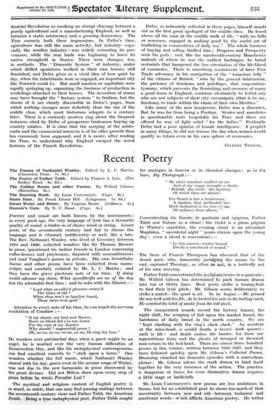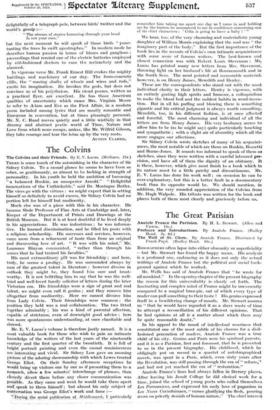Recent Poetry
POETRY and musk are both known by the instruments : in every good age, the very language of lyric has a favourite quality of sound, a timbre as of choice wood or string. Lesser poets of the seventeenth century had but to rhyme the language and it vibrated, indifferently or well, like a lute. The Rev. Nathaniel Wanley, who lived at Coventry between 1684 and 1680, collected wonders like Sir Thomas Browne in prose, questioned his luckier friends in London concerning coffee-houses and _playhouses, disputed with nonconformists and read- Vaughan's poems in private. His own Scintillulae Sacrae and' other poems have been collected from manu- scripts and carefully collated by Mr. L. C. Martin ; and they have the grave plectrum note of his time. If doing would advance my claim, What spendthrifts are we of the day run the admirable first lines : and he asks with the Silurist :- " Lord what unvallu'd pleasure crown'd The times of old ?
-When thou wer't so familiar found, - Those daieS were gold."
Attentive to every note of his time, he can touch the nervous exaltation of Crashaw
" 0 my dearie, my lord and Master,
Since no blood did e're run faster For the cure of my disaster Why should i ungratefull prone ? Oh, no no, no no, no no, no no, Ile sing thy loue."
He wonders over patriarchal days when n guest might be an angel, he is worried over the .very human difficulties of Resurrection Day, and like his metaphysical contemporaries can find excellent conceits to " stick upon a herse." One wonders whether the full music, which Nathaniel Wanley shared with his day, grave even in the secular songs of Waller, was not -due to the new harmonies in prose discovered by the great divines. Did not Milton draw upon every stop of prose before he wrote Paradise Lost ?
The mystical and religious content of -English poetry is so small, so static, that one may find passing analogy between the seventeenth century vicar and Father Tabb, the American Jesuit. Being a true metaphysical poet, Father Tabb sought
for analogies in heaven or in chemical changes : as in the lines, My Photograph :— it My sister sunshine swilled on me And of my visage wrought a shade. ` Behold,' she cried, ' the mystery Of which thou art afraid !
For Death is but a tenderness, A shadow, that unclouded !ova Hath fashioned in its own excess Of radiance from above.' "
Concentrating his fancies in quatrain and epigram, Father Tabb saw Nature as a ritual : the violet is a pious pilgrim to Winter's sepulchre, the evening cloud is an attendant Magdalen, " sacerdotal night " pours chrism upon the young day : even a chord is conventual:
" In this narrow cloister bound
Dwells a sisterhood of sound."
The fame of Francis Thompson has obscured that of the Jesuit poet, who, innocently justifying the means by the end, captured Theology, as often as not, in a butterfly net of his own weaving.
Father Tabb concentrated the joyful mysteries in a quatrain i Mr. Wilfrid Gibson has determined to pack human drama into ten or thirty lines. Most poets strike a tuning-fork to find their lyric pitch : Mr. Gibson seems deliberately to strike a match : the spurt is all. So he begins :—He ground the saw teeth with his file, As he barked his nets in the boiling cutch, He watched the belch of smoke from the tall stack.
The exasperated sounds record the factory buzzer, the night shift, the scraping of fish upon the market board, the harshness of daily bread in the north country. We are " kept clacking with the clog's clack clack." An accident at the mine-head, a sordid death, a lovers' dark quarrel : such is life : and death makes life harder, for there are superstitious fears and the ghosts of wronged or drowned men return to the bed-head. There are almost three hundred poems in this volume, written between 1925-1927, and they have followed quickly upon Mr. Gibson's Collected Poems. Browning clenched his dramatic episodes with a marvellous phrase : Mr. Gibson allows the stark drama to bind itself together by the very terseness of the action. The practice is dangerous at times, for even diminutive drama requires
a little stage or backcloth.
Mr. Louis Untermeyer's new poems are less ambitious in theme, but for an established poet he shows too much of that uncertainty between new and old—between technical and emotional words—velich afflicts American poetry. He writes delightfully of a telegraph pole, between birds' twitter and the world's - gossip
"The stream of stories humming through your head
Is not your own."
but the next moment he will speak of those birds " punc- tuating the trees In swift apostrophes." In modern mode he describes human passion in terms of blazes and ganglion's : proceedings that remind One of the electric batteries employed by old-fashioned doctors to cure the melancholy and the alarmed.
In vigorous verse Mr. Frank Ernest Hill evokes the mighty buildings and machinery of our day. The ferro-concrete cliffs, the " roaring shafts of wheels and wires and rods," excite his imagination. He invokes the gods, but does not convince us of his polytheism. His cloud poems, written as a practical flyer, are excellent. He has those American qualities of uncertainty which cause Mrs. Virginia Moore to refer to Adam and Eve as the First Affair, in a modern poem included among lyrics that are mostly romantic and European in convention, but at times pleasingly personal. Mr. N. C. Raad moves quietly and a little wistfully in that dreamy and abstract poetic world of Time, Nature and Love from which none escape, unless, like Mr. Wilfrid Gibson, they take courage and tear the lotus up by the very roots.
AUSTIN CLARKE./































































 Previous page
Previous page